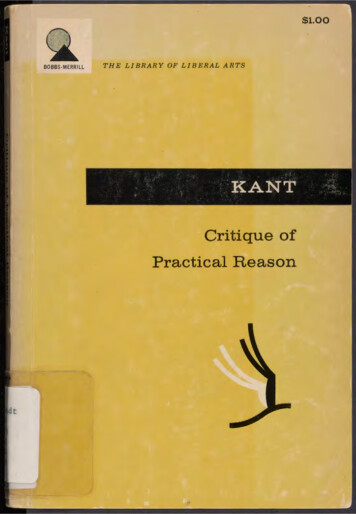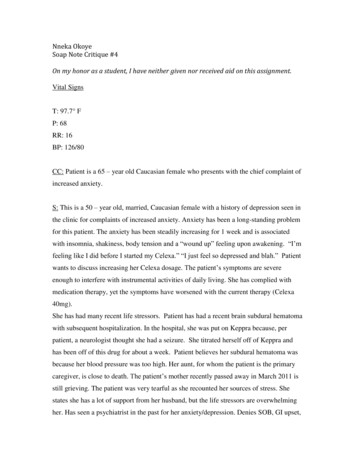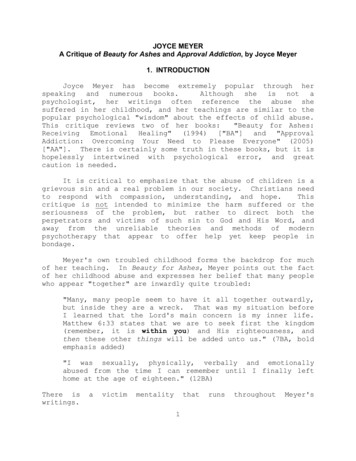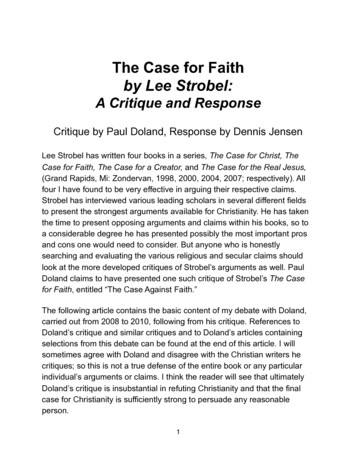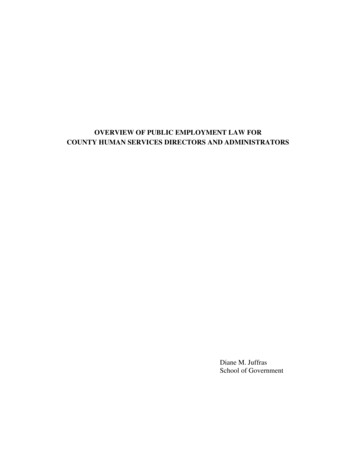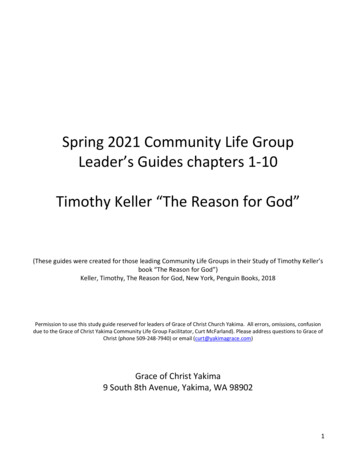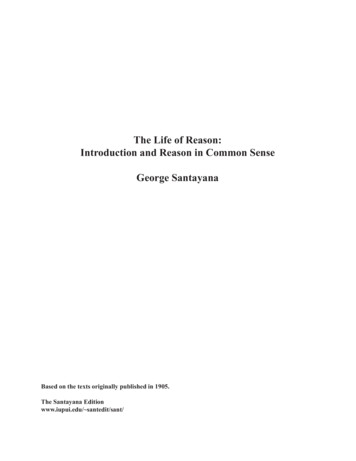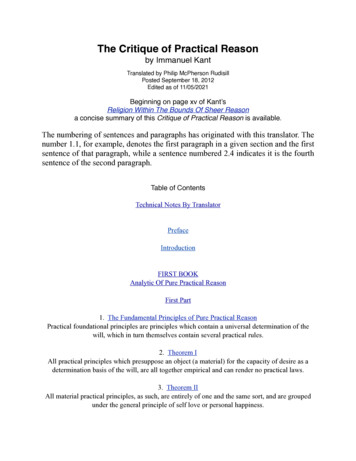
Transcription
The Critique of Practical Reasonby Immanuel KantTranslated by Philip McPherson RudisillPosted September 18, 2012Edited as of 11/05/2021Beginning on page xv of Kant’sReligion Within The Bounds Of Sheer Reasona concise summary of this Critique of Practical Reason is available.The numbering of sentences and paragraphs has originated with this translator. Thenumber 1.1, for example, denotes the first paragraph in a given section and the firstsentence of that paragraph, while a sentence numbered 2.4 indicates it is the fourthsentence of the second paragraph.Table of ContentsTechnical Notes By TranslatorPrefaceIntroductionFIRST BOOKAnalytic Of Pure Practical ReasonFirst Part1. The Fundamental Principles of Pure Practical ReasonPractical foundational principles are principles which contain a universal determination of thewill, which in turn themselves contain several practical rules.2. Theorem IAll practical principles which presuppose an object (a material) for the capacity of desire as adetermination basis of the will, are all together empirical and can render no practical laws.3. Theorem IIAll material practical principles, as such, are entirely of one and the same sort, and are groupedunder the general principle of self love or personal happiness.
4. Theorem IIIIf a rational being had to think his maxims as practical, universal laws, then he could only thinkthem as such principles which contained the determination basis of the will with regard to theirform, and not to their material.5. 1st TaskAssuming that the sheer legislating form of the maxims were of itself the sufficient determination basis of a will, we are to find the constitution of such a will (that were so determinable).6. 2nd TaskSupposing that a will were free, what would be the law uniquely suited to determine itnecessarily?7. Fundamental Principle of Pure Practical ReasonAct in such a way that the maxim of your will can always simultaneously hold as a principle of auniversal legislation.8. Theorem IVThe autonomy of the will is the solitary principle of all moral laws and of the duties conformableto them. In contrast to this no obligation whatsoever is established through any heteronomy ofdiscretionary choice. In fact this would be contrary to the principle of such autonomy and to themorality of the will.I. Deduction of the Foundational Propositions of Pure Practical ReasonII. The Authority of Pure Reason in its Practical Sphere to an Expansion which is not possiblefor it as such in the Speculative.Second PartThe Concept of an Object of Pure Practical ReasonTypic of Pure Practical Judgmental capacityThird PartThe Incentives of Pure Practical ReasonCritical Illumination of the Analytic of Pure Practical Reasoniv
SECOND BOOKDialectic of Pure Practical ReasonFirst PartDialectic of Pure Practical Reason in GeneralSecond PartThe Dialectic of Pure Reason in the Determination of the Concept of the Highest GoodI. The Antinomy of Practical ReasonII. Critical Neutralization of the Antinomy of Practical ReasonIII. Primacy of Pure Practical Reason in its Connection with the SpeculativeIV. Immortality of the Soul as a Postulate of Pure Practical ReasonV. The Existence of God as a Postulate of Pure Practical ReasonVI. Postulates of Pure Practical Reason in GeneralVII. How an Expansion of Pure Reason in a Practical Intention be Possible to think, without atthe same time in that way expanding its Realization as SpeculativeVIII. The Avowal out of a Need of Pure ReasonIX.Concerning the Proportion wisely commensurate to the Practical Determination of theHuman Recognitional CapacityDoctrine of Method of Pure Practical ReasonConclusioniv
Technical Notes By TranslatorAnschauung I render in English with “perspective” although “intuition” is far more common intranslations of Kant’s works. The suggestion of “etwas anschauen” in German is “looking atsomething” or “viewing something”. According to one person’s Anschauung there is a face of awolf in the cloud, and according to that of another person there will be no such face, but ratherthe form of a fish or perhaps nothing but a cloud. I am also partial to “sighting”, e.g., in mysighting I see the face of a cloud. Or: the face is not in the cloud, but only in one’s looking at1 thecloud. “Viewing” can also suggest much of this. And we might speak of someone’s “take” onsomething, i.e., what that person gleans from that something. I have also often used “envisagement” and like the suggestion of putting a face on something. In general the suggestion of Anschauung is a direct and personal receipt of information without any use of reasoning. For example I see that one object is to the left of another; and I see that directly and immediately. Formore on this see Anschauung.Erkenntniss. The root of this word is “kennen” which means to know or to have familiaritywith. In all of my translations I have used “recognition” over the more commonly used “knowledge”.Erscheinung. For this I use “appearance” which is very common, although I have also utilized“specter” in some other works on Kant. When St. Paul reports seeing a Jesus-in-the-sky this isgiven in German as an Erscheinung. There is a suggestion of “shining forth”. The rainbow isconsidered to be an Erscheinung by the Germans. The appearance of water on the heated roadahead which vanishes as you approach it is an Erscheinung. So the word has an affinity also with“mirage” and “hallucination”. The import for the student of Kant is that this appearance is not athing which exists on its own as it appears, but which has its existence solely within the perception.Idea is a technical term for Kant and I render it always as “Idea” and not with a lower case i.Generally it denotes a concept for which no object can be given corresponding to it, at least notgiven to the human who is limited to a sensitive perspective of things. For example there may bea soul, but this is not subject to a perspective through any looking whatsoever. Thus the soulwould be an Idea.Schein I translate as “semblance”. Another possibility would be “illusion”. The implication isthat of some misleading.Triebfeder. This I render with “incentive”. It refers immediately and, in a technical sense, to themainspring of a watch. It could also be rendered as motivating force or incentive force. I havealso considered “drive”.1This is the literal translation of Anschauung; ich schaue das an I’m looking at that.
Vernüfteln is a disparaging term which is rooted in “Vernunft” (reason) and for which I use “rational contriving” though “rationalization” or “rational concocting” could also work.Willkür is rendered as “discretionary choice”. Also “arbitrary choice” might work as well.Concerning This TranslationI have chosen to number each of Kant’s sentences and paragraphs in a format such as 4.2, whichwould indicate the fourth paragraph (of a given section) and then the second sentence of thatparagraph. I may break up Kant’s sentences into several, but they will be included all togetherunder that single number. For example, sentence 4.2 of the Preface reads:4.2For the Ideas of God and immortality are not conditions of the moral law, but rather onlyconditions of the necessary object of a will determined through that law, i.e., merely ofthe practical usage of our pure reason. Therefore we not only cannot recognize nor penetrate the actuality of these Ideas, but indeed not even their possibility.And so here I have divided the original German sentence into two English sentences, but stillunder the indicator of sentence 4.2.My comments are given as footnotes to the text. Kant’s own footnotes I have shown as paragraphnotes, following the relevant paragraph, and I have used a smaller font and a greater indentation.The reader is invited to consider Kant in a Nutshell for a cursory and incomplete review ofKant’s effort in the Critique of Pure Reason (CPR), the Groundwork of the Metaphysic of Moral(GMM), the Critique of Practical Reason (CPrR) and Religion Within The Bounds Of Sheer Reason (Religion). This may help in establishing the context of this present work as well as a shortsummary. A complete list of the translations and essays by this author can be found at:https://kantwesley.comI cordially invite the reader who spies any errors or has any suggestions to contact me atpmr@kantwesley.com.The translation now follows.vi
The Critique of Practical Reasonby Immanuel KantTranslated by Philip McPherson RudisillPreface1.1This critique is entitled only a critique of practical reason in general, and not rather a critique of pure practical reason, even though a comparison with speculative reason wouldseem to suggest the latter. The reason for this is given an adequate explanation in the treatise itself,1.2for here we are to establish merely that there is a pure practical reason and then to critiqueits entire practical capacity.21.3If we succeed in doing this, there is no need to critique the pure capacity itself in order todetermine whether reason might not have presumptuously overstepped its bounds withsuch a capacity (which indeed is the case with speculative reason);This would mean to show that pure reason is able to determine and direct the will without the necessarypresupposition of some object of desire, i.e., that this can be done immediately by reason alone. And thenwe need merely to examine how reason is able to determine the will in general.2
Preface1.4for if as pure reason it is truly practical, then it proves its reality and that of its conceptsthrough that fact, and all rational contriving against its possibility is in vain.32.1With this capacity transcendental freedom will also stand firm and indeed in that absolutesense which speculative reason required with the usage of the concept of causality in order to save itself from the antinomy into which it unavoidably stumbles if it contemplatesthe unconditioned in the series of causal connection.4 But it could only set up this conceptproblematically as not impossible to think, without securing its objective reality, butrather only not to be assailed in its existence nor be toppled into an abyss of skepticismthrough the vain impossibility of that which it must still allow as at least thinkable.53.1Now the concept of freedom, to the extent its reality is proven through an apodictic law ofpractical reason, constitutes the keystone of the entire edifice of a system of pure, evenspeculative, reason. And all other concepts (those of God and immortality), which remainin speculative reason as mere Ideas without support, are now attached to it and obtain stability and objective reality with and through it, i.e., their possibility is proven by the actuality of freedom; for this Idea is revealed through the moral law.6If pure reason is in fact found to be practical, then we don’t have to consider how this is possible. Forevery reality is ipso facto possible, even if it cannot be understood.3We know that every condition in the appearance of things is conditioned and we look for its conditionand also, via pure reason, we seek to go back to the unconditioned. This unconditioned is somethingspeculative reason requires, but then can never arrive upon. This is presented in the Third Antinomy ofCPR.The most that could be accomplished was to show that freedom was compatible with natural necessitation, but not that freedom itself were possible, and certainly not that it was a reality.4Imagine a free leaf which does not have to fall when a cold wind blows, but decides to do so anyway.This is entirely compatible with the necessity of science’s laws of nature, for we do not assert with thisthat the leaf did not fall, but only that it did not have to fall, and so it freely chose to fall, and hence it wasjust a coincidence that it chose to fall when the cold wind came. There is as yet no point in making suchan assertion and it is simply a matter of arbitrary whim to assert it. The point of the Third Antinomy of CPRis that this gratis assertion of freedom does not contradict the laws of nature. Freedom is a tenable and(thus far in the CPR) arbitrary fiction.5This will complete and unify pure reason, both speculatively and practically, for what had to remain asarbitrary, though plausible, suppositions in speculation (in the CPR) will now be established in a practicalsense. First transcendental freedom (based on the moral law) will be established, and then there will follow the postulation of the soul and God (as conditions of the Highest Good which is the morally necessaryobject of the moral law). Thus freedom might be considered the central focus of both critiques of reason.62
The Critique of Practical Reason4.1But among all Ideas of speculative reason, freedom is also the only one whose possibilitywe know a priori (even though we can still never understand it), because it is the condition* of the moral law, which we do know.74.2For the Ideas of God and immortality are not conditions of the moral law, but rather onlyconditions of the necessary object of a will determined through that law, i.e., merely ofthe practical usage of our pure reason. Therefore we not only cannot recognize nor penetrate the actuality of these Ideas, but indeed not even their possibility.84.3But nonetheless they are the conditions of the application of the morally determined willto its object (the Highest Good) which is given to it a priori.4.4Consequently their possibility in this practical referral can and must be assumed, but stillwithout recognizing or penetrating them theoretically.4.5Concerning this theoretical referral, it is sufficient in a practical intention that they containno inner impossibility (contradiction).94.6Now here is a basis for avowal which, while merely subjective in comparison with speculative reason,10 is still objectively valid for a reason which is just as pure, though practical. Indeed it is by means of the concept of freedom that objective reality and authority,and even subjective necessity (a need of pure reason) to assume them, is supplied to theIdeas of God and immortality. This is true even though this does not expand reason in atheoretical recognition, but rather only that the possibility, which previously was only aIn this CPrR we will discover the moral law as a fact (provided as a pure, practical and binding law), andthe necessary condition for the consciousness of the (binding of this) law is freedom. And so freedom willbe a fact even though we will still not be able to comprehend how any such property could be possible.7We have a will which is determined through the moral law alone, and thus without reference to God or asoul. The necessary object of this will will be shown to be the Highest Good which in turn presupposesGod and immortality as necessary conditions for the achievement of that object. And so we are not ableto prove even the possibility of freedom, God or immortality. And while we can prove the actuality of freedom, that of God and immortality will remain merely necessary, practical postulates.8While there was no evidence supporting the existence of God or of an immortal soul, there was no contradiction (no internal impossibility) in the CPR. Accordingly both are available to practical reason if needed. And they will be needed now in a practical sense in order to justify the Highest Good which is thenecessary object of a free will, i.e., a will subject to the moral law.9In the speculation of the CPR we could not prove the existence nor even the possibility of God and thesoul. But since we could also not prove any impossibility we were free to assert it, but only subjectively forthe purposes of practical reason and not objectively regarding theoretical reason.103
Prefaceproblem, is here an assertion. Accordingly the practical usage of reason is connected withthe elements of the theoretical.114.7And this need is not per chance a hypothetical one of an optional intention of speculation,i.e., having to admit something if we want to ascend to the completion of the rational usage in speculation, but is rather a prerequisite, without which that, which we are unremittingly supposed to place before us as the intent of our doing and forbearing, cannot happen.12* Kant’s footnote:1.1In order not to fancy an encounter here with inconsistencies when I term freedom thecondition of the moral law, and then assert later in the treatment that the moral law is thecondition under which we first can become aware of freedom, I will only recall that freedom in any case is the ratio essendi of the moral law, but the moral law the ratiocognoscendi of freedom.131.2For were the moral law not first distinctly thought in our reason, we would never holdourselves justified in assuming such a something as freedom (even though this still is notcontradictory).145.1In any case it would be more satisfying for our speculative reason to solve that problemfor itself and to preserve it as an insight to practical usage without this digression. But forthis our capacity of speculation is not so well endowed.5.2Those who boast of such lofty recognitions should not restrain themselves, but rathershould present them openly for probe and evaluation.5.3They want to prove it? Then so be it! Let them prove it, and the critique lays its entire armament to their feet as conquerors.By virtue of freedom (as the condition of the moral law, which will be undoubted) we find objectivemeaning to God and the soul and even a subjective need to assert them (in order to support the HighestGood which is required by the moral law). So what in pure reason was merely not impossible is assertedin practical reason to be possible, and indeed is morally necessary to be asserted as actual.11This intention is the Highest Good which we will find to be a prerequisite as the object of our moralstriving. We will find that without this object there would be no point or purpose to our moral striving and itwould become a sheer vanity.12We could not be aware of our freedom except for our consciousness of the moral law (as binding us).And it is only a free person who could be imposed upon by this law. Thus we must be free people in orderto recognize the moral law as binding, and thus it is only by means of the moral law that we will come torecognize our freedom.13Since we are able to think that a leaf might be free (see footnote to Par. 2.1 above), but have no rational basis for actually asserting such, the notion of our own freedom would be considered absurd and silly.We would be able to calculate the expected return from two alternatives and opt for the greatest, but never presume to think we could act independently of our inclinations.144
The Critique of Practical Reason5.4Quid statis? Nolunt. Atqui licet esse beatis.15--5.5Since therefore they do not in fact want to (which seems very much like they cannot doso) we must instead take them in hand to seek this in the moral usage of reason and uponthis to establish the concept of God, freedom and immortality, concerning the possibilityof which speculation does not find a sufficient guarantee.166.1Here also the riddle of the critique is first explained, i.e., how we can deny objective reality to the usage of the categories beyond the realm of the sensitive, and still concede thisreality to them with respect to the objects of pure practical reason. For at first glance thismust look thoroughly inconsistent, as long as we are familiar with such a practical usageonly with regard to its name.176.2But if we now become aware through a complete dissection of practical reason that thecited reality here concerns no theoretical determination of the categories nor any expansion of the recognition beyond the sensitive, but rather means merely that an object befitsthem in this regard somewhere because they are either a priori contained in the necessarydetermination of will, or inseparably connected with the object of that will,18 then that inconsistency disappears. In other words our use of these concepts is different from whatspeculative reason has need of.196.3On the other hand a very satisfactory confirmation of the consistent way of thinking in thespeculative critique, hardly to be expected previously, is now revealed. For since that critique called for the objects of experience as such, and among them even our own subject,to hold only for appearances, but also at the same time to lay things on their own to themas a foundation, therefore not to hold all that is beyond the sensitive to be fabrications norFrom the German translation of the Latin we can understand: A god would speak . . . “Why do you hesitate? Don’t be anxious. Do it and finally achieve happiness.”15We must give up trying to prove these three Ideas via speculative reasoning as we were instructed bythe CPR, and just accept them at the insistence of our practical reasoning, as will be shown in thispresent critique.16So at first glance it seems that we are contradicting ourselves, declaring first in the CPR that the categories of understanding have no role apart from the sensitive world of appearances, and then to asserthere in the CPrR that they have meaning after all and indeed via practical considerations.17Freedom will be determined as the necessary presupposition of the consciousness of the moral law (asbinding), and God and immortality are the conditions of the object of a will determined by the moral law.But this has meaning only in the practical, and not in the theoretical and speculative, use of reason.18Whereas the possibility of freedom and God and immorality could not be established in the CPR, thispossibility is granted by virtue of the assertion of the reality of these three per the CPrR. But this will be ofno benefit to the speculative use of reason.195
Prefaceas a concept empty of content, practical reason now, of itself and without having conspired with speculative reason, supplies reality to an extra-sensory object of the categoryof causality, namely freedom (though only as a practical concept for practical usage).Therefore what previously could only be thought is now certified as a fact.206.4In this way the strange, though incontrovertible, assertion of the speculative critique thateven the thinking subject is a mere appearance to himself in the inner perspective 21 obtains now in the critique of practical reason its complete certification and indeed so decisively that we would have come upon it here even if the first critique had not proven thisproposition at all.*22* Kant’s footnote:7.11.1The union of causality as freedom with causality as natural mechanism--of which the first isfirmly established through moral law and the second through natural law--and indeed in oneand the same subject, namely the human, is impossible without representing this in reference to the first as an thing on its own, and to the second as an appearance, the former in apure, the latter in an empirical, consciousness.231.2Without this dual way of considering things a contradiction of reason with itself isunavoidable.With this I also understand why the most considerable challenges which have come to myear thus far against this critique revolve around these very two points: namelyAll our science holds for appearance, and yet we were required to conceive of the thing on its own tounderlie these appearances, but without the possibility of sensitive evidence for this. See . And so theappearances are treated as subject to laws of nature, while the thing on its own can be conceived of asbeing free. Then what is necessitated in one regard is free in another regard. Third Antinomy of CPR.20Anschauung. See Translator’s notes above. This might also be called the “inner looking.” This is usuallytranslated as “intuition” in kantian discourse in English, and counts as a direct and immediate insight.21I recognize that I am a thinking being only because I am able to express the elements of a thought tomyself in the time-determined medium of the inner sense. It is only in this way that I can even be conscious of being able to think a thought if I wish, for the thinking is one with the expression. But thesethoughts that I think to myself are not merely thoughts that exists as such by themselves as though theirspectral (verbally articulated) appearance were a thing on their own, but rather I must assume a something X my soul, which thinks these thoughts, but concerning which I know absolutely nothing at all,except as I appear to myself in, and by means of, these thoughts. In a word, I know myself only to theextent that I appear to myself in the inner sense.22Appearance is my rendering for “Erscheinung” which suggests the looks of something. See Translator’snotes for this and also for the “brainarium.” As suggested in the section on tips for novices to Kantland wehave the capacity for considering objects of the brainarium world of appearances in this two-fold way:once as a sheer appearance (in the brainarium) and subject to laws of nature, and then also as a thing onits own (independently of any brainarium) where freedom can asserted even if arbitrarily but still consistently with laws of nature.236
The Critique of Practical Reasonon the one hand a denial of the objective reality of the categories applied to noumena inthe theoretical recognition and the affirmation of that in the practical; andon the other hand the paradoxical demand to make oneself, as the subject of freedom, intonoumenon, but also simultaneously, with regard to nature, into phenomenon in one’s ownempirical consciousness.7.2For as long as we had no determined concept of morality and freedom, we could notguess that what we would want to lay as the basis to the alleged appearance on the oneside as noumenon and, on the other side, whether it also would be possible in any way tomake a concept of that if we had already beforehand dedicated all concepts of pure understanding in the theoretical usage exclusively to mere appearances.247.3Only a detailed critique of practical reason can correct all of this misinterpretation andclearly set forth the consistent thinking manner which actually constitutes its greatest merit.8.1So much for the justification of why the concepts and foundational propositions of purespeculative reason in this work, which after all have already undergone their particularcritique, are again subjected here from time to time to a test which otherwise would hardly be appropriate to the systematic path of a developing science (since matters once decided must properly only be cited and not again bought up for discussion). But here thiswas allowed and indeed was necessary because with those concepts reason is consideredto be in a transition to an entirely different use than was made of them earlier.8.2But such a transition necessitates a comparison of the old usage with the new in order todistinguish more easily the new track from the earlier one and at the same time to note thecoherence of the two.8.3Therefore considerations of this sort, and among which those which are directed again tothe concept of freedom, though now in the practical usage of pure reason, we will consider not as insertions which are supposed to serve only in filling up holes of the critical system of the speculative reason (for this is complete in its intention) nor, as it tends to gowith a hasty construction, afterward to start bringing in props and buttresses, but rather astrue members which make the coherence of the system notable in order now to allow pen-It would be pointless to conceive of the thing on its own (noumenon) with regard to the sciences of theappearances. For the very notion of noumenon means beyond all context of the brainarium, and it is precisely on the appearances of the brainarium that the sciences are focused. But now, by means of theCPrR, we will be able to see the need for having made such a distinction earlier in the CPR, on or nearpage 258.247
Prefaceetration of the concepts in their real presentation, which could be represented only problematically in the speculative.258.4This reminder goes particularly to the concept of freedom which, we must note with consternation, many people still boast of being able to penetrate quite well and to explain itspossibility by considering it merely in a psychological sense. If, however, they hadweighed it precisely in reference to the transcendental, they would have had to recognizeits indispensability as a problematical concept in the complete use of the speculative reason as well as the complete incomprehensibility of that and, if they afterwards took it tothe practical usage, would have had to come of themselves precisely to the nominal determination of that with respect to its foundational proposition, which they otherwise soreluctantly want to understand.8.5The concept of freedom is the stumbling block for all empiricists, but also the key to themost sublime practical principles for the critical moralists who in that way understand thatthey must of necessity proceed rationally.8.6For that reason I implore the reader not hastily to overlook that which was said about thisconcept at the conclusion of the Analytic.9.1Whether such a system as is developed here of pure practical reason from its critique hasbeen too laborious or not, especially in order not to miss the correct perspective fromwhich the whole can be properly sketched out, I must leave to those familiar with such awork to evaluate.9.2It presupposes indeed the Groundwork to the Metaphysic of Morals (GMM), but only tothe extent that this provides a preliminary familiarity with the principle of duty, and renders and justifies* a determined formula of that duty. Otherwise this critique is completein itself.9.3The division of all practical sciences was not added for completion as was done in the critique of speculative reason. A justification for this will be found in the constitution of thecapacity of practical reason.9.4For the particular determination of duties as human
Sep 18, 2012 · practical reason, constitutes the keystone of the entire edifice of a system of pure, even speculative, reason. And all other concepts (those of God and immortality), which remain in speculative reason as mere Idea
